
Overview
To become a doctor in India, one should have a High Merit or Surplus Money. Globally, several students travel to different destinations to pursue their dreams and careers. This migration usually occurs from the eastern part to the western part of the world due to better Infrastructure of Universities, global exposure, and availability of specific specializations and career opportunities. If we discuss medicine as a specialty, the reasons for migration from India to other countries are very distinct from those of English-speaking countries and Europe.
In India, getting an MBBS Seat in any of the Govt colleges is the most challenging task in the world. This is primarily due to the need for Infrastructure and the availability of faculties in Medical Colleges. The government has implemented many reforms in the medical education sector, such as relaxing the norms of opening new medical colleges and academic criteria to become a faculty member in a medical college to increase the MBBS seat availability. Despite these efforts, getting an MBBS seat is many's dream.
As per government reports published on various platforms over a while, more than 40% of non-clinical and 65% of faculties in clinical subjects are not available in Medical colleges, which were opened recently in the last five years, leading to severe impacts on medical students' learning. Hopes for getting an MBBS seat become leaner yearly for the medical aspirants. In 2023, approx. 18,000 Indian students are enrolled in medical universities globally, over 1/3rd of Pvt Med College students in India!
MBBS Abroad – Important Links
Difficult to get a Govt. Seat in India
India has been facing continuous challenges in its medical education infrastructure for decades, including the disconnect between education and health service delivery, the high cost of education, the underutilization of existing resources, and the diversity of entrance examinations for medical seats, among others. Overall, there has been a constant drive to improve the doctor-to-population ratio to ensure better access to healthcare services.
In 2023, more than 21 Lacs students collectively appeared for India's most prestigious Medical Entrance Exam NEET-UG to secure their MBBS Seat in 706 Govt and Private Medical colleges, approx. In the last five years, the government and private sectors added 185 medical colleges with 23,000 seats. Despite these efforts, the chances of getting an MBBS Seat in India dropped from 6.68% to 5.29% in the last five years. This is because of the growing number of NEET UG aspirants and the slow-paced evolution of the medical education infrastructure, which can meet the ever-increasing demand for MBBS seats.
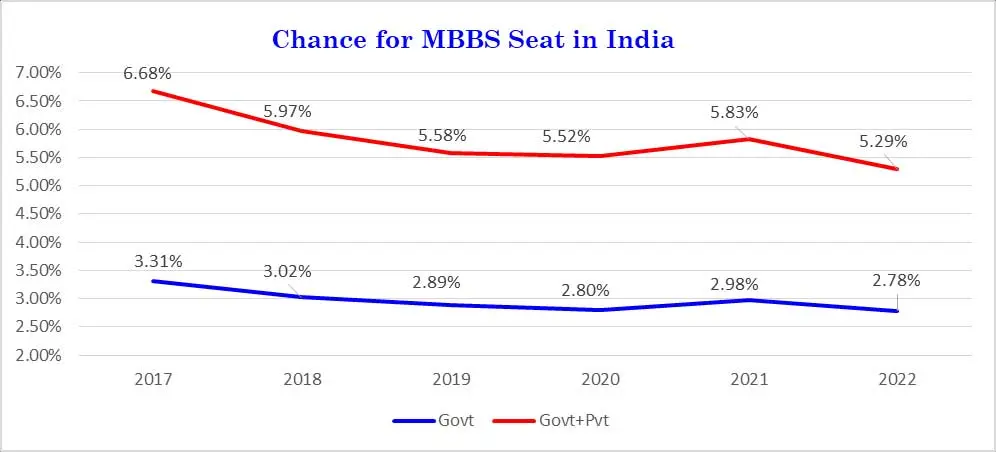
As of the year 2023, India has 13.01 lakh registered allopathic doctors. It is expected that 10.4 Lacs, 80% of registered doctors, are active in public healthcare. India has a 1:1346 doctor-to-population ratio, far below the Global norm of 1:1000. The shortage of Healthcare professionals in India leads to the elevated demand for doctors.
You can refer to the below table to take a look at the MBBS Medical College's trend-
| YEAR | MBBS Colleges | MBBS Seats | NEET Applicants (in Lacs) | Govt. Seat | Govt. + Pvt Seat | ||||
|---|---|---|---|---|---|---|---|---|---|
| Govt | Pvt. | Total | Govt | Pvt. | Total | ||||
| 2017 | 218 | 232 | 450 | 35870 | 34290 | 70160 | 11.4 | 3.14% | 6.16% |
| 2018 | 227 | 237 | 464 | 37140 | 35040 | 72180 | 13.3 | 2.79% | 5.44% |
| 2019 | 245 | 242 | 487 | 39385 | 35890 | 75275 | 15.2 | 2.59% | 4.95% |
| 2020 | 279 | 254 | 533 | 42735 | 37640 | 80375 | 15.9 | 2.67% | 5.03% |
| 2021 | 285 | 269 | 554 | 43335 | 39840 | 83175 | 16.1 | 2.69% | 5.16% |
| 2022 | 355 | 293 | 648 | 45125 | 45990 | 91115 | 18.7 | 2.41% | 4.86% |
| 2023 | 399 | 307 | 706 | 54168 | 50165 | 104333 | 21.0 | 2.58% | 4.97% |
High tuition Fees in Private Medical Colleges in India
If we look at Indian Private Medical Colleges, they offer three types of seats: Govt Seat, Management Seat, and NRI Seat. Paying hefty amounts of 60 Lacs to 1.5 Cr made the dream of becoming a doctor almost next to impossible for a student belonging to a middle-class family. This dream even looks worth less for those who can afford it, as Private Medical College has a low inflow of patients,lacks quality infrastructure, and has ashortage of faculties.
| Type of College | Management Seat | NRI Seat |
|---|---|---|
| Deemed University Colleges | 75-90 Lacs | 1.25-1.75 CR |
| Private Medical Colleges | 60-70 Lacs | 1.25 CR |
| MBBS Abroad University | NA | 25-40 Lacs |
Moreover, the compulsion of clearing the NEXT Exam to get the License in India made the pathway even more complex for Private Medical college students. Nonetheless, students get to study at a Public University Abroad, holding more than 100 years of experience at an affordable price. Hence, MBBS Abroad is worth choosing over aPrivate Medical College in India.
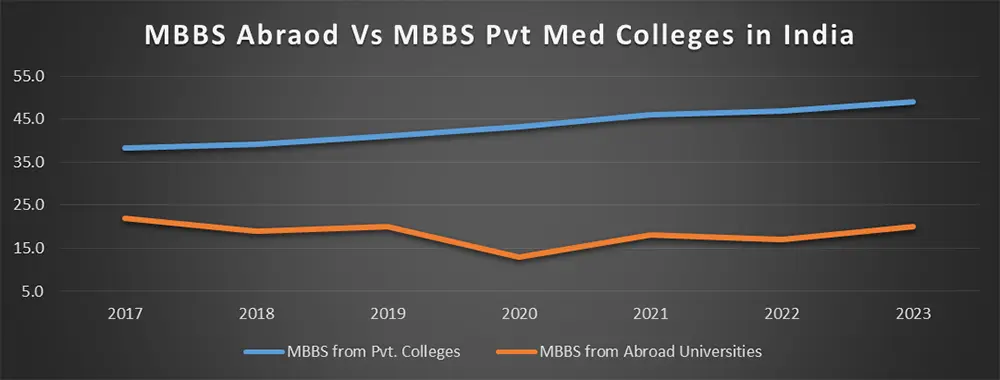
Advantages of MBBS Abroad
There are numerous benefits to the MBBS Abroad over studying at a Private Medical College in India. Please look at the table below to understand the values we fetch in MBBS Abroad on various crucial parameters before deciding the right path.
| Key Parameter | MBBS Abroad | Pvt Medical College |
|---|---|---|
| University Type | Public & Private Both | Only Private |
| World Ranking | Available | Not Available |
| Recognition | WHO, WFME, ECFMG, US GMC, UK etc | NMC and very few international recognition |
| Teaching Experience | Up to 200 Years | Mostly up to 10 Years |
| Tuition Fee | 2-5 Lacs / Year (Affordable) | 8-25 Lacs / Year (Expensive) |
| Global Exposure | Very High, Students from across the world | No Exposure |
| Teaching Methodology | Small Groups of 15-20 Students in each batch Test after every Conceptual Class | 100-150 students in a batch |
| Grading of Academics | Mostly European Credit Transfer System (ECTS) | University Level, CBME |
| Opportunities for Global Medical PG | US, CANADA, Gulf Region, UK and other European Countries, India | Primarily India |
| Patient Interaction | Moderate to High | Very Less |
| Affiliated Hospitals | Multiple Hospitals for different speciality | College Hospital only |
MBBS Abroad destination
Students move to different destinations depending on their Budget, Education patterns, Cultural ties, Weather conditions, Food preferences, distance from India, etc.
Below are the Major destinations for MBBS Abroad. Click any country name for more information about the MBBS Program in a specific country.
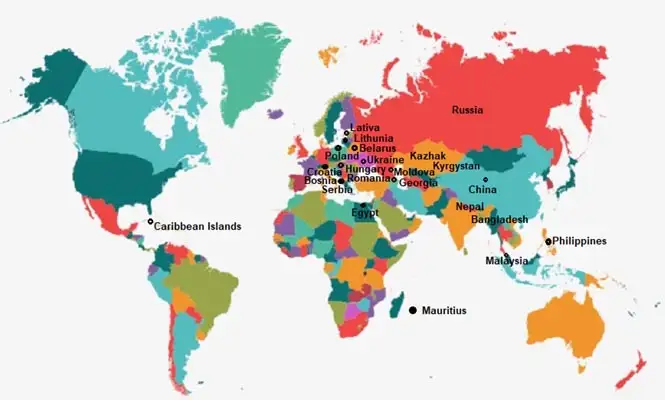
Countries for MBBS in Asia
| Nepal | Mauritius | Malaysia |
| Bangladesh | Kyrgyzstan | Philippines |
| Kazakhstan | Uzbekistan | China |
| Egypt | Azerbaijan |
Countries for MBBS in East Europe
Countries for MBBS in Europe
| Czech Republic | Lithuania | Spain |
| Poland | Serbia | Latvia |
| Romania | France | Bosnia |
| Slovakia | Bulgaria | Albania |
| Italy | Macedonia | United Kingdom |
Countries for MBBS in America
Education Pattern of MBBS Abroad
Every country has a varied education system to deliver medical education to its students. Most Asian countries were colonies of the Western world in the last 150-200 Years. These countries adopted modern medicine (Allopathic Medicine) education from the Western world. Each country developed its Medical education based on community needs and long-term vision for the healthcare system post-independence. Broadly, there are three systems adopted by different countries, namely-
Asian Education System
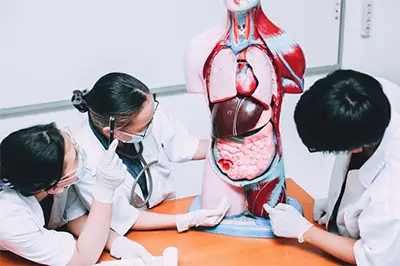
Asian countries follow the education system, which comprises a bachelor's program with a duration of 4-1/2 or 5 years followed by an internship of 1 year, which makes a complete program of 5-1/2 to 6 years. Due to the low doctor-to-population ratio, these countries permit the students to practice independently after a Bachelor's Degree. MBBS degree holders in Asian countries are considered General Physicians. The Academic Assessment is made every year in most countries. Basic Eligibility to enter the Bachelor's Program is 10+2 / Senior Secondary with Physics, Chemistry, and Biology.
European Education System

Balkan Countries / East European and EU countries award an MD, a Bachelor's Degree. The duration of the MD Program is 6 Years, and internship / Clinical rotation is an integral part of regular study and continues over six years of studies. As most European countries have established Health Care Systems, each one follows the ECTS system, a European norm to make the system uniform across the EU countries. This system ensures minimum education standards across European universities and presents opportunities to transfer without any academic loss across EU countries.
The European Credit Transfer and Accumulation System (ECTS) is followed throughout the semester to make the students' academic assessments. Basic Eligibility for the Medicine Bachelor's Program is 10+2 / Senior Secondary with Chemistry, Biology and Physics. Many countries ask for mathematics as a subject, and in Europe, physics is considered equivalent to math. Any Graduate cannot practice unassisted; they must go for a Master's Program to obtain the License to practice. However, this program is usually offered in their Native Language, while a few Universities deliver programs in French, a widely spoken language in Europe. Learn more about PG in the UK (PLAB) and Medical PG in Germany.
American Education System
The US, Canada, South American countries, and the Philippines follow the American system, where the student must do a Bachelor of Science (BS) program first, followed by a 4-year MD course. The Doctor of Medicine (MD) course consists of 2 years of Basic Medical Science (BMS) and 80 weeks/2 years of Clinical rotation. You must be a specialist to practice in the US, and an MD has to clear the USMLE Exam to get into the Residency Program (Master Program equivalent to MD/MS in India) to become a specialist. The Trimester system is utilised to make the academic assessment. Know more about Medical PG in the USA (USMLE)

Duration, Degree awarded in MBBS Abroad
Refer to the table below for the MBBS/MD course duration and the Degree awarded after completion. Note thatAn MD degree is a bachelor's Degree equivalent to anMBBS only.
*Reference has been taken from the World Directory of Medical School (WDOMS) site, respective University websites, etc.
| Country | Duration of Course | Degree Awarded | Medium of Instruction |
|---|---|---|---|
| Nepal | 4.5+1 Year of Internship | MBBS | English |
| China | 5+1 Year of Internship | MBBS | English |
| Bangladesh | 5+1 Year of Internship | MBBS | English |
| Kazakhstan | 5+1 Year of Internship | MBBS | English |
| Kyrgyzstan | 5+1 Year of Internship | MBBS | English |
| Uzbekistan | 5+1 Year of Internship | MBBS | English |
| Russia | 6-Year Incl Internship | MD | English / Bilingual |
| Georgia | 6-Year Incl Internship | MD | English |
| Ukraine | 6-Year Incl Internship | MD | English |
| Armenia | 6-Year Incl Internship | MD | English |
| Egypt | 6-Year Incl Internship | MD | English |
| Poland | 6-Year Incl Internship | MD | English |
| Belarus | 6-Year Incl Internship | MD | English |
| Romania | 6-Year Incl Internship | MD | English |
| Slovakia | 6-Year Incl Internship | MD | English |
| Bosnia | 6-Year Incl Internship | MD | English |
| Lithuania | 6-Year Incl Internship | MD | English |
| Serbia | 6-Year Incl Internship | MD | English |
| Croatia | 6-Year Incl Internship | MD | English |
| Moldova | 6-Year Incl Internship | MD | English |
| Hungary | 6-Year Incl Internship | MD | English |
| Czech Republic | 6-Year Incl Internship | MD | English |
| Latvia | 6-Year Incl Internship | MD | English |
| Caribbean | 5 YearsIncl Internship | MD | English |
| Malaysia | 5 Year, No Internship for Foreign Nationals | MBBS | English |
| Mauritius | 5 Year, No Internship for Foreign Nationals | MBBS | English |
| Philippines | 2 Yrs BS+ 4.5 MD +1 Year Internship | MD | English |
Eligibility for MBBS Abroad
Most Universities abroad follow specific benchmarks to admit international students for the MBBS/ MD course. All universities abroad deliver medicine programs in their native language for local students, bilingual programs for international students, and entirely in English for international students. International students are primarily admitted to the English Program, but agents often accept Indian students into the Bilingual Program, which NMC doesn't approve. You must meet the criteria set by the respective University for admission and the NMC criteria to obtain the License to practice in India. Find the table given below to learn about Country admission criteria-
| Country | Academic Eligibility in 10+2 Grade | NEET Score | Written Test / Interview | Eligible to practice in India |
|---|---|---|---|---|
| Nepal | 50% in PCB | Qualified | No | Yes |
| China | Different criteria for all the Universities, Mostly 65%+ in PCB | Different Scores for Different University | Few Univ | Yes |
| Bangladesh | 70% in 10th Grade & 60% PCB | Qualified | No | Yes |
| Kazakhstan | 50% in PCB | Qualified | No | Yes |
| Kyrgyzstan | 50% in PCB | Qualified | No | Yes |
| Uzbekistan | 50% in PCB | Qualified | No | Yes |
| Russia | 50% in PCB | Few Univ | Few Univ | Yes |
| Georgia | 50% in PCB | Few Univ | No | Yes |
| Ukraine | 50% in PCB | Few Univ | No | Yes |
| Armenia | 50% in PCB | Few Univ | No | Yes |
| Egypt | 70% in PCB | Few Univ | No | Yes |
| Poland | 70% in PCB | Few Univ | Yes | Yes |
| Belarus | 50% in PCB | Few Univ | Yes | Yes |
| Romania | 50% in PCB | Not Req | Yes | Yes |
| Slovakia | 50% in PCB | Not Req | Yes | Yes |
| Bosnia | 50% in PCB | Not Req | No | Yes |
| Lithuania | 50% in PCB | Not Req | Yes | Yes |
| Serbia | 50% in PCB | Not Req | Yes | Yes |
| Croatia | 50% in PCB | Not Req | Yes | Yes |
| Moldova | 50% in PCB | Not Req | No | Yes |
| Hungary | 50% in PCB | Not Req | Yes | Yes |
| Czech Republic | 80% in PCB | Not Req | Yes | Yes |
| Latvia | 50% in PCB | Not Req | Yes | Yes |
| Caribbean | 50% in PCB | Not Req | No | No |
| Malaysia | 50% in PCB | Qualified | No | No |
| Mauritius | 50% in PCB | Qualified | No | No |
| Philippines | 50% in PCB | Qualified | No | No |
Academic eligibility and age criteria for MBBS Abroad are the same as in India; the only difference is the validity of the NEET Score, which is three years in the case of MBBS Abroad. For India, only the current year's NEET score is valid for counselling.
| Category | 10+2 or Equivalent Grade | Neet Score | Age |
|---|---|---|---|
| GEN | 50% in PCB | Qualified in any 2022, 2023 or 2024 NEET Exam | 17 Years |
| ST/SC | 40% in PCB | ||
| OBC | 45% in PCB |
Cost of MBBS Abroad
The cost of the MBBS Abroad program varies from 20 Lacs to 1 Cr based on the country and University selection. Hence, check your budget for the complete MBBS program before finalising any country or University Abroad. In addition, there may be variations in cost primarily because of the destination. The cost of the complete program is divided into three major categories –
- Tuition Fee for MBBS Abroad
- Hostel & Private Accommodation
- Cost of Living Abroad
Tuition Fee for MBBS Abroad
The Tuition Fee for MBBS Abroad is uniform for all the students admitted to a particular program, irrespective of their nationality. The tuition fee for all the coming years before commencing the session remains constant. Usually, the MBBS tuition fee is the lowest for classes conducted in their native language, moderate for bilinguals, and highest for entirely English-taught courses.
Hostel & Private Accommodation
Most of the time, the University offers hostel accommodation to international students. These hostels have different categories of rooms, such as independent rooms, interior facilities, varied Infrastructure, attached washrooms, living space, shared rooms (2-4 students), etc. The hostel charges differ depending on the category of rooms. The hostels are allocated based on the availability of rooms when the student reaches the University. Each room comprises basic Infrastructure, including a bed-mattress, table, wardrobe, central heating system, etc.
If any individual desires a private apartment, they can opt for it too, at an actual cost. The cleaning of hostel rooms is the student's responsibility. However, it is recommended that you pick the university hostel, considering the language barrier and lack of knowledge of city routes and local laws. Usually, the hostel's charges typically range from 500 USD to 2500 USD annually, depending on the country.
Indian Food
Every hostel has a shared kitchen on every floor where the students can cook the food. The University provides a standard facility such as an Induction cooktop, Fridge, and Microwave ovenin the kitchen area. Above all, the utensils and other utilities must be fetched by the students. Students can join Indian Mess if it is available. Several Universities abroad offer Indian Mess; these messes are headed by private contractors that provide three meals - Breakfast, Lunch, and dinner. These messes are usually available in Russia, Belarus, Armenia, Bangladesh, Nepal, Kazakhstan, Kyrgyzstan, Uzbekistan, Ukraine, etc. The monthly cost of the mess will range from 100 to 150 USD, depending upon the no of meals.
Cost of Living Abroad

The cost of living consists of all your expenses, including Personal expenses. Nonetheless, personal expense entirely depends upon a student's needs and lifestyle. During the initial months, the fees will be increased as one needs to buy clothing, shoes, and other necessary items to settle down in a new environment. The average living cost of a student, excluding food, is around 80-100 USD a month. In the EU countries, this is on the higher side.
Medical License in India after MBBS Abroad
During MBBS study, a student realises the importance of being a specialist. They also understand the competitiveness of securing an MD / MS Seat in a Govt. College. Let's look at the success ratio to get a PG Seat in Govt Medical Colleges in India, which is 11% broadly; we can say that only 1 out of 10 will get a PG Seat, whereas the chances of getting Clinical speciality is 1 out of 20 applicants. The PG journey will be challenging, or students should have enough money to get a paid seat in Pvt Medical College in Crores!
| Total Applicants NEET PG 2023 | Specialty | Govt Med College | Pvt Med College | |
|---|---|---|---|---|
| Seats | Success Ratio | Seats | ||
| 2.06 Lacs | ||||
| MD (Non Clinical) | 15K | 8.6% | 10K | |
| MS (Clinical) | 8K | 4.6% | 5K | |
| Total | 23K | 11.4% | 15K | |
Will early preparation and the right mentorship pave your dream of becoming a specialist? NMC has already announced the introduction of the NEXT Exam in India in 2024. This Exam will replace all Medical PG exams in India. The Exam will be conducted in two parts: NEXT-1 and NEXT-2.
The Objective of the NEXT-1 is to assess the Student's Knowledge of Pre, Para, and Clinical Subjects on the National Level. Only after qualifying for NEXT-1 will any medical student be eligible for an internship. After completing the internship, Students must go through NEXT-2, assessing their Clinical skills, Patient Management, and Keeping Medical history. Those who will Clear NEXT-2 will be awarded a license to practice, and Rankers of NEXT-1 will get PG seats of their choice of speciality. You may refer to Page for detailed information on the NExT Exam.
Medical PG in the USA (USMLE) after MBBS Abroad
Most Abroad students also plan to do a Medical PG from the USA because getting PG Seats in India is brutal.
With the introduction of NEXT, most students in India are attracted to USMLE prep from 1st year of MBBS since it simulates the new NMC Competency-based curriculum remarkably. The US healthcare system is considered one of the best healthcare systems in the world for numerous reasons, such as high rewards, excellent Infrastructure, merit-based assessment, and open opportunities for super specialities. Most countries try to replicate the US healthcare assessment system for their Medical Graduates. The USMLE exam is divided into 3 Parts. One can appear in USMLE Step 1 after 2nd Year, USMLE Step 2 CK during internship and Step 3 during residency (Medical PG).
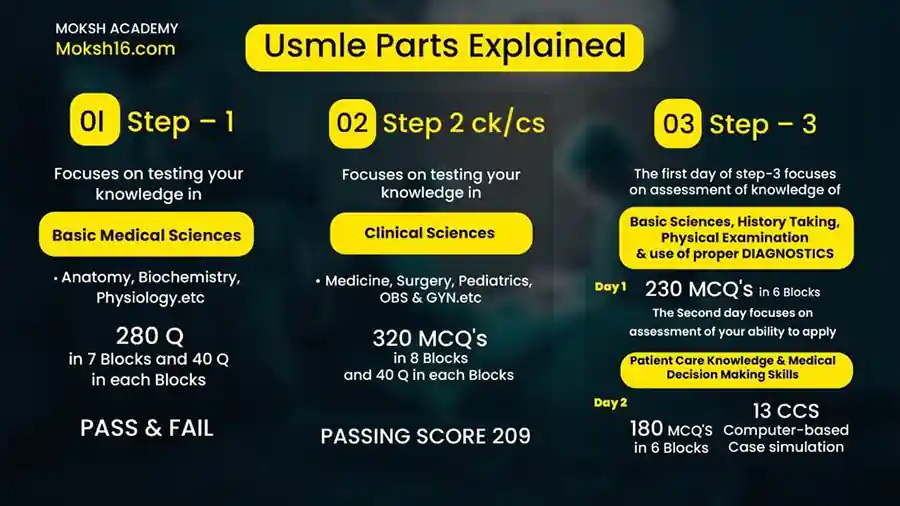
MOKSH Coaching focuses on a patient-centered learning approach which helps students score high on both USMLE & NEXT. MOKSH is the leading name in USMLE Coaching. Currently, 1000+ Students from Indian and Abroad medical colleges are preparing for USMLE steps via the MOKSH Platform.
Medical PG in the UK ( PLAB) after MBBS Abroad
The Board Test (PLAB test) is the instrument used to assess the skills and knowledge of an International Medical Graduate. It also judges whether they can be trained to practice medicine in the UK.
In short, an IMG's performance in PLAB determines her Eligibility to practice in the UK. The PLAB test has two stages. PLAB 1 is an exam that has 180 MCQs that test your recall. On the other hand, PLAB 2 is a practical OSCE (Objective Structured Clinical Exam) that tests your clinical skills.
The GMC ascertains your linguistic skills by assessing your score on specific tests. It may be the IELTS (Band Score 7.0 or higher) or OET (Grade B in reading, writing, listening & speaking).
After you pass PLAB 1 & 2, you apply for the GP registration. There is one constraint. You have a window of 2 years after clearing PLAB 2, which you can use no later.
By 2024, the UK Medical Licensing Assessment will replace the PLAB. Consequently, the GMC UK will change certain things in PLAB and create the UKMLA exam.
Medical PG in Germany after MBBS Abroad
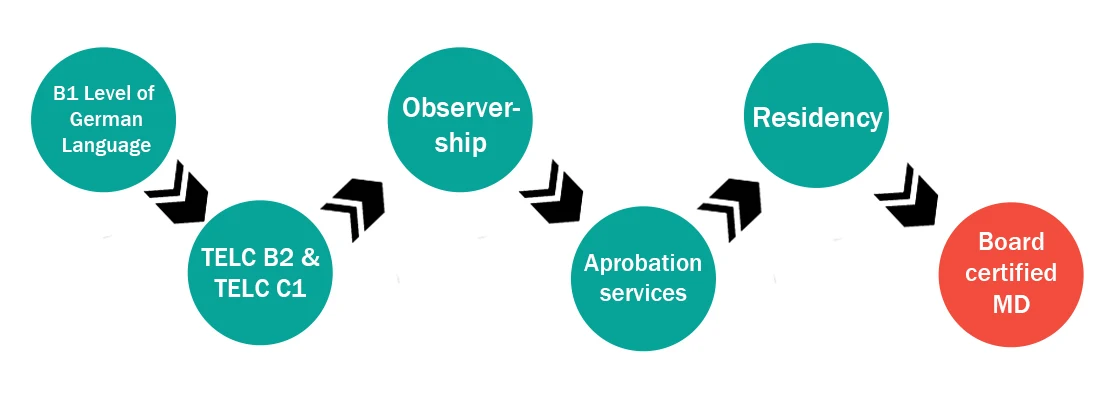
PG in Germany after MBBS Abroad is another excellent option, though it requires you to learn the German language. Of the six levels starting from A1 to C2, you need to clear A1 and A2, qualifying you to apply for the visa.
Once the Language formalities are done, you get into the phase where you do an Observer-ship from a German hospital approved by the German Medical Council. Residency follows this.
This may sound simple here, but the process is quite complicated. To know more about PG in Germany,
Your Chance to get an MBBS Seat in India
The most challenging time for any student is to wait after the NEET counseling process to know whether they are getting a college of their choice. Sometimes, this dilemma continues for a couple of months due to multiple rounds of counseling. It has become more difficult due to parallel counseling of All India Quota and various States due to COVID-19. The counseling process is very complex, where 700+ Govt. and Private colleges offer 1 Lac+ Seats, and fee variation is also huge, ranging from less than 1 Lac to 2.5 Cr for the course.






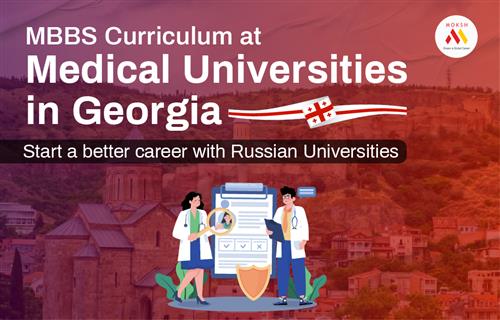
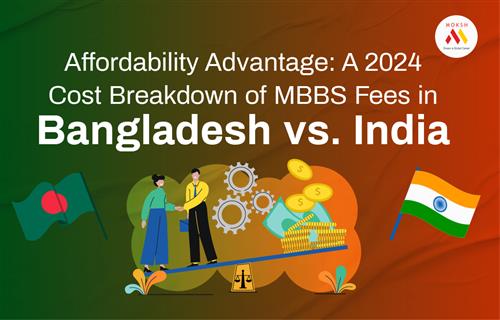
.png)
